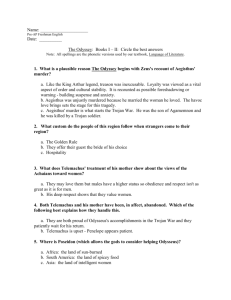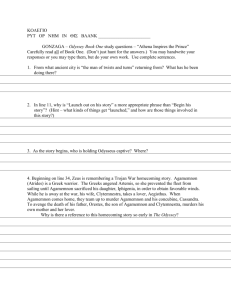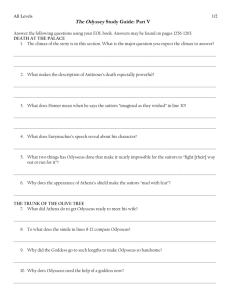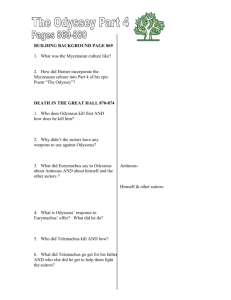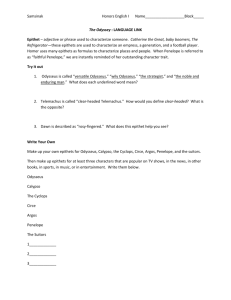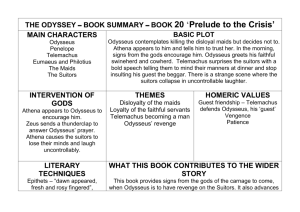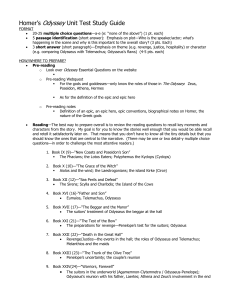odyssey books 1-4 test - Sarah Mahajan Study Guides
advertisement
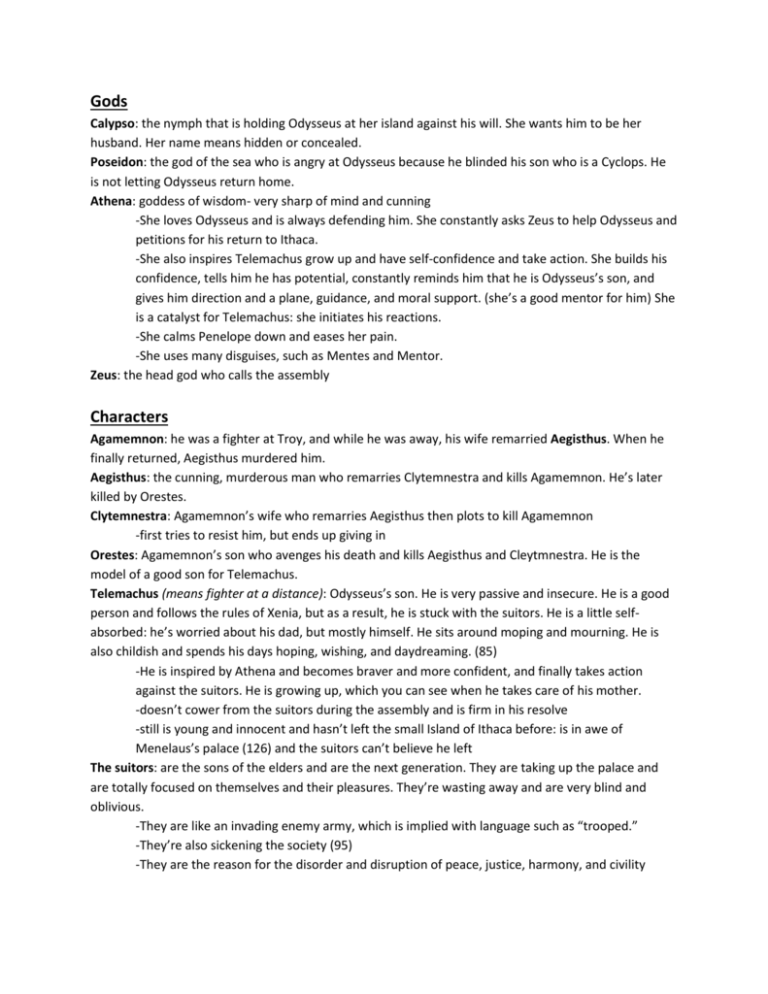
Gods Calypso: the nymph that is holding Odysseus at her island against his will. She wants him to be her husband. Her name means hidden or concealed. Poseidon: the god of the sea who is angry at Odysseus because he blinded his son who is a Cyclops. He is not letting Odysseus return home. Athena: goddess of wisdom- very sharp of mind and cunning -She loves Odysseus and is always defending him. She constantly asks Zeus to help Odysseus and petitions for his return to Ithaca. -She also inspires Telemachus grow up and have self-confidence and take action. She builds his confidence, tells him he has potential, constantly reminds him that he is Odysseus’s son, and gives him direction and a plane, guidance, and moral support. (she’s a good mentor for him) She is a catalyst for Telemachus: she initiates his reactions. -She calms Penelope down and eases her pain. -She uses many disguises, such as Mentes and Mentor. Zeus: the head god who calls the assembly Characters Agamemnon: he was a fighter at Troy, and while he was away, his wife remarried Aegisthus. When he finally returned, Aegisthus murdered him. Aegisthus: the cunning, murderous man who remarries Clytemnestra and kills Agamemnon. He’s later killed by Orestes. Clytemnestra: Agamemnon’s wife who remarries Aegisthus then plots to kill Agamemnon -first tries to resist him, but ends up giving in Orestes: Agamemnon’s son who avenges his death and kills Aegisthus and Cleytmnestra. He is the model of a good son for Telemachus. Telemachus (means fighter at a distance): Odysseus’s son. He is very passive and insecure. He is a good person and follows the rules of Xenia, but as a result, he is stuck with the suitors. He is a little selfabsorbed: he’s worried about his dad, but mostly himself. He sits around moping and mourning. He is also childish and spends his days hoping, wishing, and daydreaming. (85) -He is inspired by Athena and becomes braver and more confident, and finally takes action against the suitors. He is growing up, which you can see when he takes care of his mother. -doesn’t cower from the suitors during the assembly and is firm in his resolve -still is young and innocent and hasn’t left the small Island of Ithaca before: is in awe of Menelaus’s palace (126) and the suitors can’t believe he left The suitors: are the sons of the elders and are the next generation. They are taking up the palace and are totally focused on themselves and their pleasures. They’re wasting away and are very blind and oblivious. -They are like an invading enemy army, which is implied with language such as “trooped.” -They’re also sickening the society (95) -They are the reason for the disorder and disruption of peace, justice, harmony, and civility Penelope: sharp, good with her hands, full of intrigue, manipulative, cunning (homophrasus: the whole family is sharp and cunning) -first impression: is “wary and reserved” and “not alone”, she’s accompanied by her ladies who are her support. She has a veil over her face, cutting herself off from the rest of the world, and is crying, both signs of uninterest in the suitors. Phemius: the palace bard. He sings of the people who returned to Troy, making Penelope sad. Antinous: suitor #1. He’s despicable, rude, pigheaded, and selfish. He’s the most likely to marry Penelope. When Telemachus draws the assembly, he blames Penelope, and casts the blame off of the suitors. He “saunters” up to Odysseus after the assembly, feeling like he won. Eurymachus: suitor #2. He’s sharp and good with words. He recognizes that the guest who was Athena made a difference with Athena. At the assembly, he insults the elder and prophet Halitherses, Telemachus, and Penelope. He belittles Halitherses and uses language that implies there is no truth in his words, it’s just crazy babble. Eurycleia: the very loyal and ancient nurse. Laertes, Odysseus’s father, bought her but never shared her bed because he was afraid of the queen’s anger. Now she takes care of and protects Telemachus and loves him to death. (91) -when she realizes Telemachus is leaving for a journey, she is worried for him and for the kingdom that he is the only heir of Halitherses: the prophet and elder who speaks up at the assembly. He says that Odysseus is alive and he will come home in disguise Leocritus: another suitor who mocks Telemachus Nestor: older, wiser, talkative -he’s had a blessed, splendid life: he made it home from Troy safely and is surrounded by his sons. -he’s very pious and is always showing piety towards the Gods. -very talkative: rambles a bit -gives Telemachus advice: don’t stay away from home for too love otherwise they’ll eat away your patromony Pisistratus: Nestor’s youngest son who accompanies Telemachus to Sparta Pylos: lavish (obvious through their ceremonies) and incredibly hospitable Sparta: lavish, magnificent, radiance, sparkly (126) Menelaus: Agamemnon’s brother -follows Xenia and is offended when one of his people violated Xenia -notices Telemachus and Pisistratus are nobility when he first sees them, but doesn’t say anything he just prompts them -piety: denies that his palace is like Mount Olympus -was very close to Odysseus Helen: Menelaus’ wife- she’s very independent -tells the story of how she saved Odysseus and was the hero -slips drugs in their drinks Medon: the herald of Ithaca. He tells Penelope of the suitors’ plan to ambush Telemachus. He’s loyal. Iphthime: Penelope’s sister. She comes back as a ghost to comfort Penelope. What we find out about Odysseus: -he’s cunning, sharp in mind, always has a plan, has a way with words, shrewd, mapped out the maps, is a brilliant tactician -he’s worthy enough for Athena to go through all this for him -under pressure, he can remain calm and cool headed (133) -willing to be brutal to accomplish the bigger goal (133) The assembly: fickle, passive, apathetic (93) -starts out in procession and order, but ends in chaos and discord -hasn’t met since Odysseus left: there has been no civility since he left- it’s a sign that things are wrong with the kingdom. It also shows that now Telemachus is finally taking charge now, but hadn’t before. -they don’t even care anymore and are keen to leave (101) -nobody is in control -the rules have washed out -they need Odysseus: Telemachus can’t do it by himself vs. The Gods’ assembly: -order and procession throughout -Zeus is the leader -it’s very organized The Agamemnon Story -when Nestor tells it: the language = of a conquest -“lay siege”, “surrender”, “guard”, “sweet prize”, “conquest” -Clytemnestra tried to resist Aegisthus, but he won in the end -language is just like Penelope’s suitors!! (an invading army) -Orestes is a good son and got revenge for justice and thus gained respect and fame. -when Menelaus tells it, it now focuses on Agamemnon’s return -Aegisthus invites Agamemnon over for a welcome home dinner, then kills him -it becomes more brutal as we learn more about it: betrayal, seduction, deceit -told from different points of view: Athena, Zeus, Nestor, Menelaus, until Agamemnon himself Themes and motifs -Hospitality and Xenia -it’s the ultimate sign of civility and humanity- civilization is treating others with respect. -woven around the fact that this stranger who could be a god in disguise -Telemachus is bound by Xenia to allow the suitors to stay and run around (81) -Nestor and Pylos are very hospitable and follow the rules of Xenia (107) -Menelaus is also very hospitable and follows Xenia (126) -Piety for the Gods -Nestor is very pious and shows piety for the gods all the time (107) -Menelaus -Proteus told Menelaus that he didn’t offer a sacrifice to the gods, so now he has to go home through the Egyptian waters: he wasn’t pious, and now he’s being punished (139) -Metus: weaving, web, scheming, plotting -Penelope weaves a loom to dupe the suitors (96) -Mentor says the suitors are “weaving their violent work” (100) -Nestor says for “nine years we wove a web of disaster for those Trojans” (111) -Disguise and infiltration -Halitherses prophesizes that Odysseus will return in disguise (99) -Menelaus talks about how Odysseus “infiltrated Troy” and how the wooden horse was his idea. The wooden horse infiltrates the walls of enemy territory (132) -Menelaus and his comrades disguise themselves as seals (138) Terms Eponym: proteus protean = adaptability, changeability Epic simile: Odysseus is the lion and the suitors are the fawns- the lion will kill the fawns (135) Catalog or list of people: Proteus lists the people and what happened to them (140) Epithets: Odysseus = the man of twist and turns Calypso = the bewitching nymph Athena = sparkling eye Athena Zeus = who marshals the thunderheads Poseidon = Earth-Shaker Hermes = Giant-Killer Nestor = breaker of horses Nestor = the noble charioteer Menelaus = the red-haired king Menelaus = the lord of the warcry
